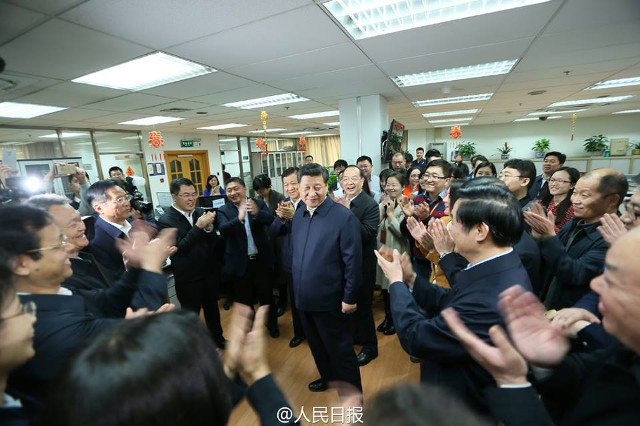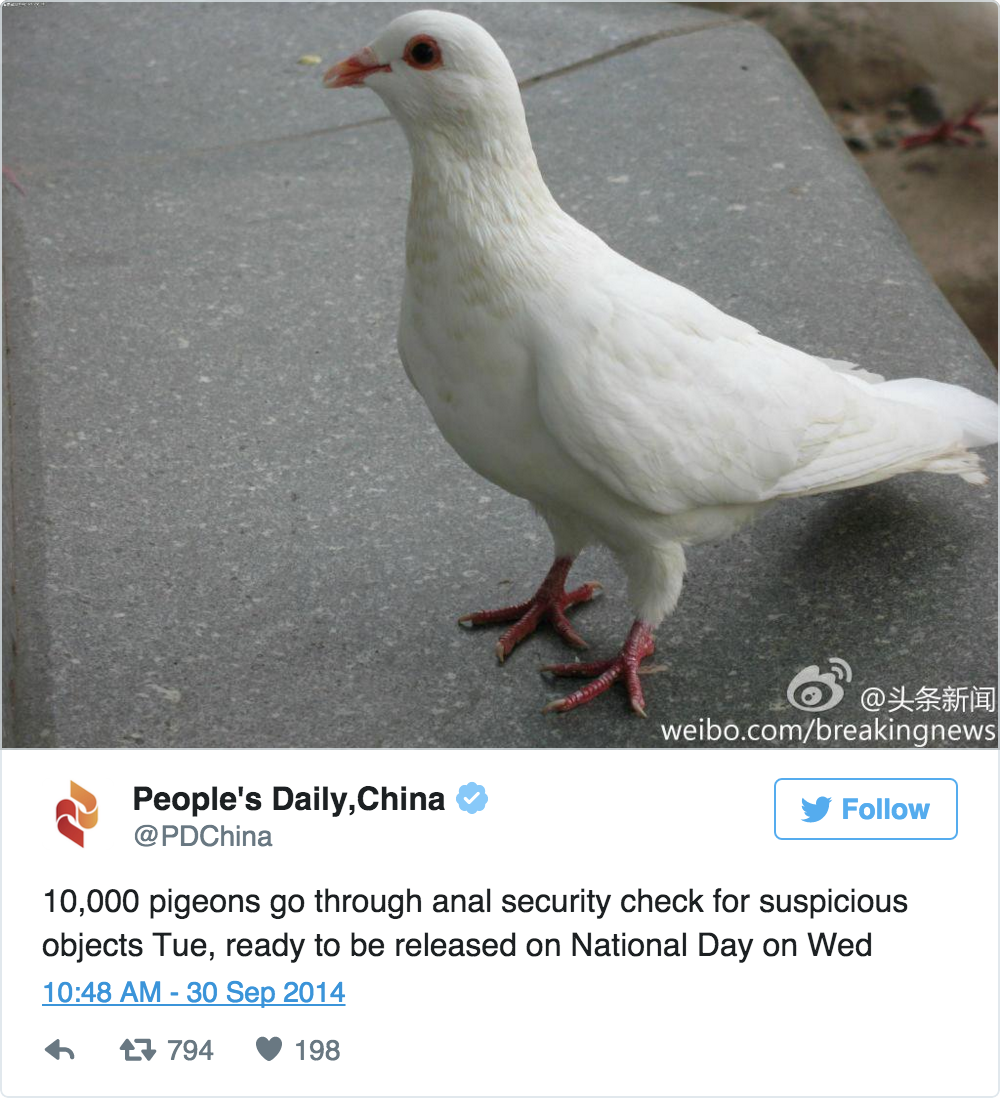by Brian Hioe
語言:
English
Photo Credit: CCTV
The Most Dramatic Move Yet in a Year of Crackdowns on Press
IN A YEAR which has already seen unprecedented crackdowns on the press, China recently announced a ban on foreign media publishing online in China. The ban was announced on February 14th and is set to take effect starting from next month.
Specifically, all foreign-based companies are banned from publishing online in China. This ban is, of course, primarily targeting foreign media operating in China, although concerns have been raised about how wide-reaching the ban will be enforced for foreign companies which are not media outlets.
Yet the possible implications of the ban may mean the shuttering of news bureaus in China run by international news outlets, including major international media outlets such as the New York Times, Reuters, the Financial Times, and others. The ban would mean that only completely Chinese-owned companies will be allowed to report on China, in which case they will subject to the Chinese government signing off on all articles before they are published. Obviously, this will mean extreme restrictions on what information is allowed to circulate about China.
The past year’s crackdowns on media include the arrest of Chinese journalists, who are sometimes made the scapegoats for the missteps of the government, and the continued censorship of news events in China, particularly regarding events that occurred in volatile outer Chinese territories as Inner Mongolia, Xinjiang, and Tibet. Worries about the Chinese government encroaching upon media outside of China itself has been raised with the disappearance of five booksellers in Hong Kong who published tabloid books about the private lives of Chinese government officials, and renewed attempts at establishing control of media in Taiwan through buying up media outlets.
The recent ban on foreign media was also foreshadowed by the refusal of the Chinese government to renew the visa of French journalist Ursula Gauthier. How international media outlets will respond remains to be seen. A possibility would be news agencies moving to places outside of China proper but close enough to still report on China, such as Hong Kong or Taiwan. When Beijing-based New York Times journalist Austin Ramzy’s visa was not renewed in 2014, he first moved to Taiwan, then to Hong Kong. But then again, China’s attempts at diminishing press freedoms increasingly extends to outside Taiwan and Hong Kong in the background.
The New “Media Monopoly”?: Hopes by the Chinese Government for State-Run Media to Replace International Media Outlets?
NEWS OF THE ban first broke in English with a Quartz article published on February 18th. It is noteworthy, however, that Xi Jinping conducted a high-profile visit to Chinese state-run media outlets such as the People’s Daily, CCTV, and Xinhua on February 19th. Ironically, before news of the press ban broke, Xi’s visit became the laughingstock of foreign commentators because of the incongruous nature of the visit and the hypocrisy of Xi’s statements during his visits, given the restrictive press environment in China.
In retrospect, we can see that through his visit to state-run media outlets, Xi was probably telegraphing the direction he intends to move in regards to international press reportage of China. Xi may mean for state-run media, many of which already provide English-language content, to step up and fill the void left by foreign outlets from becoming unable to report on China from within. In that way, the Chinese state would be able to wholly control the information about China which circulates to the international world.
 Xi visiting what appears to be the People’s Daily. Photo credit: People’s Daily
Xi visiting what appears to be the People’s Daily. Photo credit: People’s Daily
As China’s attempts to buy up media outlets in Taiwan in order to control their reporting have been termed “media monopoly” in Taiwan, perhaps we may also use the term for China’s attempts to control international coverage of China. In some sense, China intends to monopolize media coverage of China, in order to selectively control the image of China which circulates abroad. But will this work?
Will the Press Ban Go Awry?
OF COURSE, given the political and economic importance of China, there certainly is a need for international reportage upon it. This is something China itself needs, if it is to continue to host foreign investment or hopes to expand its business ventures in the international world. But if foreign media is to be displaced by Chinese state-run media outlets, in evaluating present English-language coverage of China by state-run media outlets, one is often struck by the poor quality of their journalistic works, even apart from questions of censorship.
Indeed, state-run media has been laughed at when the central party organ of the People’s Daily, for example, seems to have no idea how to manage its English-language social media accounts, as perhaps best exemplified by the unforgettable Tweet about security preparations for Chinese National Day: “10,000 pigeons go through anal security check for suspicious objects Tue, ready to be released on National Day on Wed”—which led to questions about why the People’s Daily felt this to be an important piece of information worth to be sharing, as well as mockery by Chinese netizens. Incongruous articles by the People’s Daily, of all media outlets, also include listicles such as its “10 Chinese female stars with most beautiful faces”, ”Top 20 hottest women in the world in 2014” (and the list never seems to have been updated for 2015), or “China’s Top 10 Unique Bridges, Highways and Roads”. Certainly, Chinese state-run media has a lot to work on in terms of its reporting if it is to hope to replace foreign media.
 The now infamous Tweet. Photo credit: People’s Daily
The now infamous Tweet. Photo credit: People’s Daily
But apart from questions of news quality, it also is at the end of the day, media outlets as the People’s Daily, the Global Times, or Xinhua are propaganda organs of the Chinese state and this is always quite evident on their news reporting. Though state-run media may make a pretense to objectivity, the sheer visibility of this is forever visible in editorials, or selective reporting only on stories which depict China in a positive light. The propagandistic and jingoist nature of Chinese propaganda would prevent anyone from taking state-run media seriously as an objective news source. This may be to China’s detriment. If international news reportage on China is especially important for continued foreign investment in China, foreign investors may be discouraged from investing in China when the Chinese government has attempted to keep unexpected mark fluctuations out of the news, for example.
Likewise, Chinese diplomacy sometimes strikes as reflecting an inability to grasp foreign discourse, for example, in the use of invective which becomes laughable. A famous example would be referring to the Dalai Lama, whom China views as a separatist radical bent on splitting Tibet from China even when the world at large views him as an icon of peace, as “a wolf in monk’s robes, a devil with a human face but the heart of a beast.” The hammer-fisted nature of Chinese propaganda may backfire, only to further drawing attention to the Chinese government’s attempt to fan up nationalism for its own purposes, if Chinese propaganda becomes the only sources of reporting on China from within it.
The rap video praising Xi Jinping released by CCTV. Photo credit: CCTV
This is particularly true where China seems compelled to condemn critics in the harshest of terms to the degree that this becomes ridiculous. And the sometimes strange content published by state-run media combines with its propaganda efforts in bizarre ways which much of the world would find absurd. The most recent example would be a bizarre rap video singing the praises of Chinese president Xi Jinping, preceded months before by a video of foreigners praising Xi in such effusive terms as to be laughable, a Korean woman in the video stating that she would like a husband like Xi.
In this way, would the press ban go awry for China? Might the press ban not allow China to enforce that only positive depictions of China circulate abroad, only to draw more attention to the lack of freedom of information in China? If the press ban backfires, we might conclude that the actions of authoritarian regimes sometimes seem to be driven less by rationality, but by a self-governed logic that sometimes is the engine of its own undoing. This would be another case in point.


 Xi visiting what appears to be the People’s Daily. Photo credit: People’s Daily
Xi visiting what appears to be the People’s Daily. Photo credit: People’s Daily The now infamous Tweet. Photo credit: People’s Daily
The now infamous Tweet. Photo credit: People’s Daily